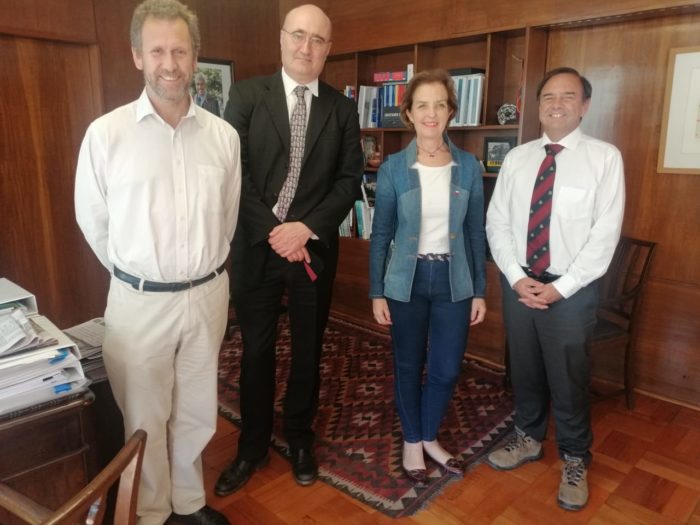My friend Professor Juan Carlos Muñoz Abogabir is Chile’s new Minister of Transport. He is a Bus Rapid Transit expert and an eloquent advocate for sustainable and just transport planning, and is also one of the nicest people I know.
Juan Carlos has already been a leader through turbulent times. In the 2000s was a key advisor to the project that created Transantiago, a government agency managing all public transport in the capital region. The reform introduced integrated bus service planning and also changed the motivations of bus drivers. I remember riding a Santiago bus with Juan Carlos in the bad old days of 2004: Bus drivers raced down the street, cutting each other off in hopes of grabbing the passengers at each stop. And since they made money from taking passengers on but not for letting them off, people sometimes had to jump from the bus as it slowed but didn’t quite stop.
The implementation of Transantiago, however, was a disaster. When the system was turned on in January 2007, some parts of it hadn’t come together. Not enough new buses had arrived. Not all the necessary technology was ready. The incentives weren’t quite right. The result was a couple of months of chaos. Everyone who touched it, including Juan Carlos, was blamed. It even affected the President’s approval rating.
Large-scale transformations like Transantiago are to some extent always like this. They were changing an entire sector of the economy over to a new model, in a way that required many people to see their jobs differently. You can flip the switch on a designated date, but people take longer to adapt and there’s always some conflict in the meantime. In any case, the messy implementation doesn’t mean the reform wasn’t worth doing. Over time, the biggest problems were fixed, the network began functioning and the anger quieted down.
A few years later, I saw Juan Carlos give a presentation on the Transantiago implementation, and was struck by the tone: He was not defensive at all. He explained that this was a necessary reform but that Chile’s transport leaders, not excluding himself, had screwed it up. He knew that failure is a better teacher than success, and he wanted everyone in the world to benefit from their meltdown.

During my 2019 trip Juan Carlos set up a meeting with then-Minister of Transport & Telecommunications Gloria Hutt to talk about my work on access analysis. From left to right: Juan Carlos, yours truly, Minister Gloria Hutt and Vice Minister José Luis Domínguez.
Fast forward to 2019. The institute that Juan Carlos leads, CEDEUS, was planning a major global conference in Santiago when the country erupted in violent protests. All conferences were canceled, including his, because nobody could guarantee the security of visitors. I had been booked as a speaker at the conference, but Juan Carlos asked if I would come anyway, and do some events around the edges of the crisis. So I went, and lacking translation services I did a few presentations in my then-terrible Spanish. I described the experience here.
Obviously Juan Carlos grieved at the way that the social unrest began: a massive act of vandalism against the Santiago Metro. But he shared the protesters’ demand for change, and he worked to channel the energy toward revealing the injustice of the built environment and transport systems.
So I’m just delighted at this announcement. Chile is wealthy enough to do things, but its car ownership is low enough that it can still choose to avoid many of the worst mistakes of North America. And it has the perfect transport leader for the moment.

Hi
I’m Carmen Duque, partner of ALALUF&DUQUE FOTOGRAFIA. I read your article and I want to corect your info about the portrait of Juan Carlos Muñoz, next minister of chilena government. That Picture was made by us in 2007 for Universidad Católica.
Thank you
I think that Transantiago has been, by far, a better tŕansportation system than the precedent one. However its implementation disrupted during months the lives of hundreds of thousands of people in Santiago The political coalition of the new elected Chilean President -and Mr. Muñoz too-should be aware that radical reforms, despite of its good motivations, can change people’s life for the worse -with consequences lingering not months but decades- if they are abruptly implemented and ideologically guided.
This is great to see. Someone who know the facts of Bus Rapid Transit in charge.
My main transport interest is getting the best out of existing Busways.
Unfortunately our Minister of Transport said this week ..new proposed light rail would be “Capable of carrying up to 15,000 passengers per hour at peak, which is four times more passengers than a dedicated busway or trackless trams.”
Huge scope changes like Transantiago are somewhat similar to this all the time. They were changing a whole area of the economy over to another model, such that it was necessary for many individuals to see their positions unexpectedly. You can flip the switch on an assigned date, yet individuals take more time to adjust and there’s generally some contention meanwhile.